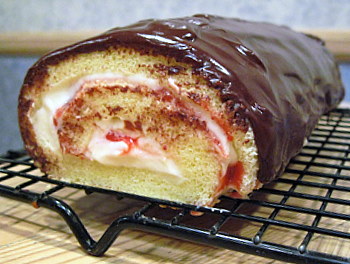Eggs are classified by size all over the world. The standard size of a chicken egg in the US is “large” and refers to an egg that is about 60 grams (from 57 to 64g, actually). Anything outside this range gets a different size designation: small, medium, extra large, jumbo. Since most commercially produced eggs fall into the large category, every recipe written in the US for US cooks assumes these as the standard size unless otherwise indicated in the recipe.
A large egg, cracked, yields approximately 3 1/2 tablespoons of liquid. The yolk will be about 1 1/2 tbsp and the whites will be about 2 tbsp. An extra large egg will have about 4 tbsp of liquid inside, while a medium egg will have only 3 tbsp. These differences have no effect whatsoever on omelettes, hard boiled eggs or many other savory dishes, but they can actually have a big impact on baked goods.
With a recipe that calls for only one egg, the difference between sizes may not be noticeable. Substituting 4 extra large eggs in a recipe that only calls for 4 large eggs will add an extra half-an-egg in volume to your recipe. This changes the ratios given in the recipe and can mean that you’ll end up with a drier or eggier finished product, one not quite as good as would have been achieved with the right sized eggs. Extra large eggs can be a good deal when it comes to eggs for breakfast, but if you know you’re going to be dealing with a lot of eggs for baking (especially in egg-heavy recipes), it is often best just to buy the size of egg dictated in the recipe itself (large, if not directly specified).
The size classifications vary a bit by country. In the UK, a large egg is slightly bigger than in the US. In Australia, it is slightly smaller. Keep in mind that these differences will not affect most recipes, but that when you are dealing with a large number of eggs it could become an issue and measuring or weighing your eggs is a good idea.





Ingrid
September 12, 2008Unfortunately when my husband goes to the store he doesn’t pay close attention to what he’s grabbing. I can’t complain too much as he’s trying to “help” me!
Do you suggest taking out the extra egg once tehy’ve been lightly beaten?
Thanks for the info!
~ingrid
Marilyn
September 12, 2008I live at 5,300 feet & am a frequent baker. I always use jumbo eggs. It seems to take care of not only needing more liquid at this altitude, but the usual low humidity issues.
Nicole
September 12, 2008Ingrid – Yes, taking out an extra tablespoon or so of the lightly beaten egg will work well if you end up with jumbo eggs.
Marilyn – That is a great tip for high altitude bakers – thanks!
ed seward
September 12, 2008I had not considered what egg size could mean for a recipe. I always thought an egg was an egg and bought by price, which ever size was on sale that day
I E FOOD
September 12, 2008Thanks for this cooking tip!! I never thought about this before.
Pavlina
September 12, 2008I always buy extra large eggs and have never noticed any difference in “normal” baked goods, but if I were to make an angel food cake, I would ensure I had the large instead of the extra large size.
Delilah
September 13, 2008Weigh your eggs for precision baking. Otherwise, you’re just guessing. Most professional bakers use Grade A large eggs, which weigh approximately 2 ounces each (out of the shell) or a bit less than 1/4 cup.
Mrs.Sound
September 13, 2008Honestly. I really didn’t know this until I have read your article post.
http://www.foodista.com
Scott at Realepicurean
September 13, 2008I generally buy extra large, I don’t know why. Bigger is better, isn’t it?
Jennifer
January 10, 2012I never really thought about this, but I just baked a cake and it seems dry. I looked at the eggs I used, and low-and-behold, they were extra large! Next time I’m going to pay closer attention to the size of eggs I am using (and buying).
Laura
February 28, 2012Jennifer, from my understanding a dry cake would be more likely with too small eggs, not too large. But a wrong size definitely could affect the texture in some way!
Margaret
August 17, 2012I buy Jumbo eggs and this is very true in that, when cooking no big deal really since things will just be creamier but in baking large is the way to go. I had forgotten once and never again. I was baking a chocolate cake (not box) and used my Jumbo’s instead of my large and ended up with a really good tasting brownie instead of a cake. Family still able to enjoy but it was not what I was planning
Anna
September 5, 2012I’ve never bought extra large eggs, but a friend sent me an Ina Garten recipe which calls for 6 of them. Thanks for doing all the math on this one!
Buzzer
October 10, 2012Haha… I just made a batch of oatmeal cookies for friends, and I used Jumbo instead of Large because that’s all I had on hand! And now I either have super-soft cookies (underbaked) or super thin and brittle/crumbly. Either way, they fall apart when I bring them to work or frisbee. Unfortunately, I have to cheat and cool them (this soggy batch) in the freezer before heading out… so it’ll look fine in the bag, but crumble as my friends take them out. That way it’s their fault for manhandling the cookies. (Because that’s the way the cookie crumbles…)
Kathie Hoffmann
January 31, 2013I just need to add that I buy range-free and organic eggs, they only come in Large. So I use 2 eggs to accomplish the x-large. That part gets to be expensive.
Ari
July 9, 2013What if you’re doubling or tripling a recipe that calls for one egg? Does this still apply (as in, does the aversion to using too many extra-large eggs in place of large eggs still apply)?
Nicole
July 11, 2013Ari – Yes, it does. If you use three extra large eggs in a recipe that calls for 4 large eggs (or a quadrupling a recipe), you could end up with almost a whole extra egg in your batter! If you have to work with extra large eggs and are using a lot of them, you can break them into a bowl, whisk them up a bit and measure out the appropriate amount of egg (approx 3 1/2 tbsp for each large egg called for in the recipe)
Angie Osborn
November 18, 2013Ok, so I really need help right away if possible!! This morning I am making a carrot cake for the first time, and the recipe calls for 4 extra lrg eggs. And all I have is large sized eggs. I would like to just add one more egg. Is that going to be ok? The comments posted have mainly mentioned that they use jumbo and extra large eggs, but I do a lot of baking and usually only buy large sized eggs. Someone please help me!! Thanks so much!
Nicole
November 18, 2013Angie – You won’t quite need a whole extra large egg, just about 2 tablespoons (about 2/3 egg) of extra egg. You can whisk up that extra egg in a small bowl and measure out two tablespoons and add them to your batter.
Leslie
November 26, 2013Just measured a medium organic, free range, egg. Slightly less than 1/4 cup. I guess medium is ok if it’s a good one.
Rodney Thomas
January 8, 2017I have been baking for a number of years, this Christmas for some odd reason my cakes have fallen in the center, when I remove them from the over. Could the eggs have something to do with it, I have been purchasing my eggs from Walmarts, the box states large but the yolks seems to be much larger. Can someone help?